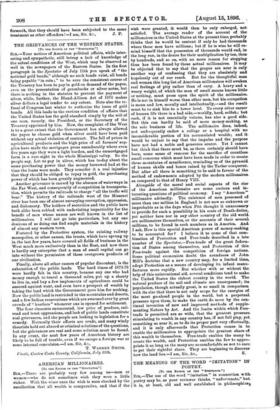THE GRIEVANCES OF THE WESTERN STATES. [To THE EDITOR OF
THE " SPECTATOR-1
Sin,—Your notices of American political affairs, while inter- esting and sympathetic, still betray a lack of knowledge of the actual conditions of the West, which may be observed as well in the newspapers of the Eastern States. In the first paragraph in the Spectator of July 11th you speak of "the national gold bonds," although no such bonds exist, all bonds being payable "in coin ; " to be sure the consistent course of the Treasury has been to pay in gold on demand of the payee, even on the presentation of greenbacks or silver notes, but there is nothing in the statutes to prevent the payment of silver, while, further, the Bland-Allison Act of 1878 makes silver dollars a legal tender to any extent. Note also the re- fusal of Congress last winter to authorise the issue of gold bonds. All this leads to the curious condition of affairs that the United States has the gold standard simply by the will of one man, namely, the President, or the Secretary of the Treasury appointed by him. Now, the complaint of the West is to a great extent that the Government has always allowed the payee to choose gold when silver could have been paid without any actual violation of contract. The fall of prices in agricultural products and the high price of all farmers' sup- plies have made the mortgages press unendurably where even five years ago they were a light burden, and the unmortgaged farm is a rare sight in the whole Mississippi valley. So the people say, Let us pay in silver, which has to-day about the same purchasing power that the money borrowed had at the time the loans were made. They consider it a real injustice that they should be obliged to repay in gold, the purchasing power of which has been greatly augmented.
Another grievance is caused by the absence of waterways in the Far West, and consequently of competition in transporta- tion, which permits the railroads to charge "all the traffic will bear." The history of the railroads west of the Missouri river has been one of almost unvarying corruption, oppression, and dishonesty. The holders of securities and the public have both alike been robbed with undeviating impartiality for the benefit of men whose names are well known in the list of millionaires. I will not go into particulars, but any one desirous of so doing can find ample materials in the history of almost any western town.
Fostered by the Protective system, the existing railway monopolies, or other causes, the trusts, which have sprung up in the last few years, have covered all fields of business in the West much more exclusively than in the East, and now there is hardly any enterprise that a man of small capital can go into without the permission of these overgrown products of our civilisation.
Finally, above all other causes of popular discontent, is the exhaustion of the public lands. The bard times of 1873-78 were hardly felt in this country, because any one who had money enough to travel a thousand miles, put up a shanty to live in, and buy a few implements of agriculture could be assured against want, and even have a prospect of wealth by taking the land which the Government gave him for nothing. Now the public land is restricted to the mountains and deserts, and a few Indian reservations which are swarmed over by great crowds of " hustlers " whenever one is opened for settlement.
The four elements enumerated, low price of produce, rail-
road and trust oppressions, and lack of public lands constitute real grievances, and the people are looking to legislation for a remedy. Naturally their efforts are crude, and many windy theorists hold out absurd or criminal solutions of the questions, but the grievances are real and some solution must be found. In any event, the next few years of American history are likely to be full of trouble, even if we escape a foreign war or some internal convulsion.—I am, Sir, SL3., T. WARREN SMITH.
11),ole, Contra Costa County, California, July 25th.


































 Previous page
Previous page